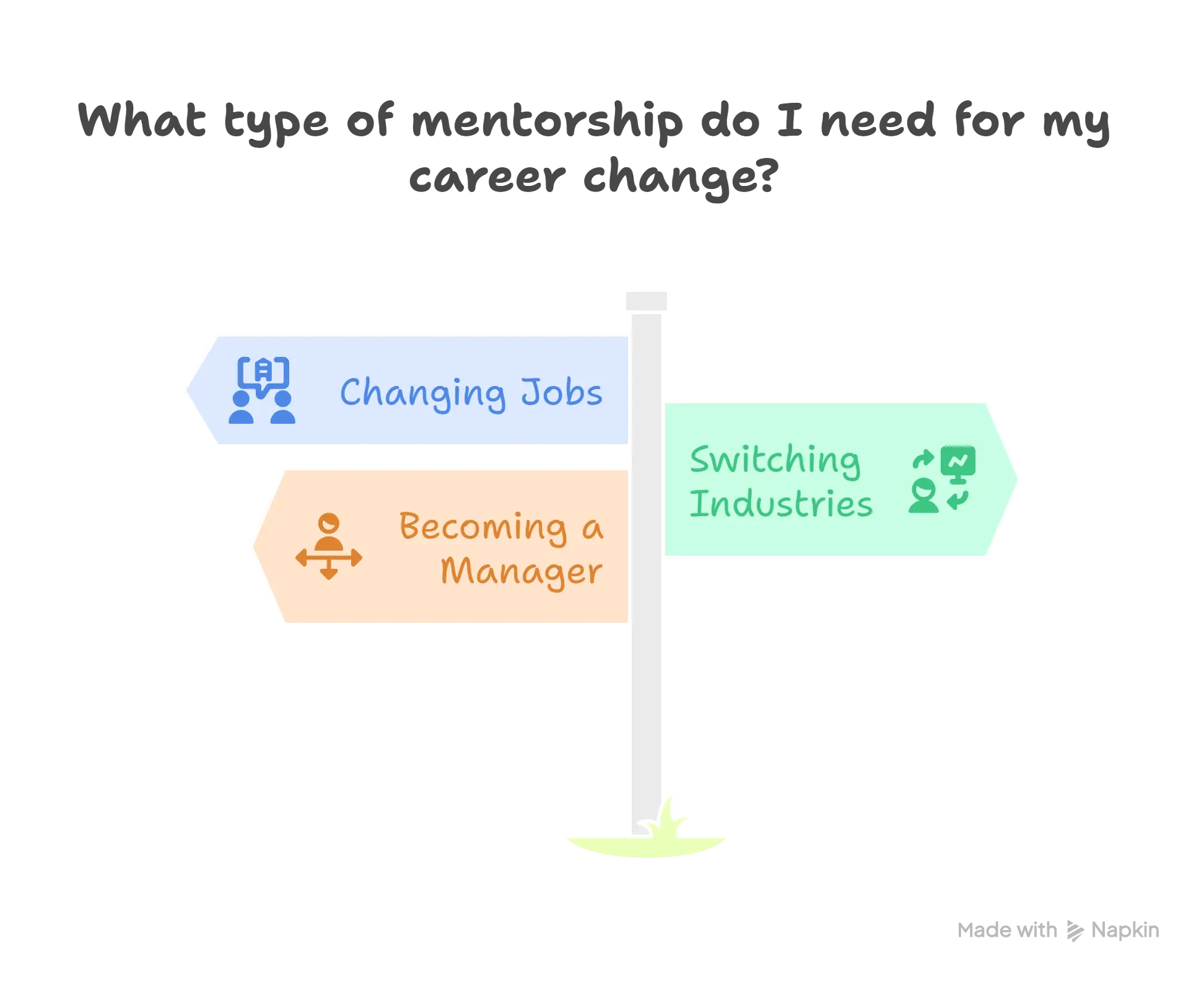
Career mentorship can change your professional life. Here's a surprising fact: 76% of people think mentors are important, but only 37% actually have one. This gap is a huge missed opportunity.
Research shows that 75% of executives credit their success to mentors. Even better, 90% of employees with mentors are happy at work.
Whether you're starting your career, changing jobs, or looking for advancement, the right mentor can speed up your growth like nothing else can.
What is Career Mentorship and Why It Works
Career mentorship is simple: an experienced professional guides someone who wants to grow. It's different from training or coaching because it's personal and adapts to your specific goals.
The results speak for themselves. Studies show that 25% of people with mentors get salary increases, compared to just 5% without mentors.
Here's what makes modern mentorship powerful:
- Focus on specific skills you need
- Access to insider networks
- Real industry insights
- Learning from real experience
- Support during tough career moments
Why Mentorship Actually Works
Mentorship works because of how we learn. We learn best by watching and copying successful people. When you have a mentor, your brain creates new patterns based on their experience.
Research across different types of mentoring shows positive results for both behavior and attitude changes.
Key benefits include:
- More confidence from seeing success up close
- Less self-doubt through honest conversations
- Better decisions from expanded thinking
- Higher motivation from accountability
| What You Get | How Much Better | How Fast | Long-term Result |
|---|---|---|---|
| Skill Growth | 25% faster learning | 3-6 months | More promotions |
| Better Network | 3x more connections | 6-12 months | More opportunities |
| Confidence | 40% boost | 2-4 months | Leadership ready |
| Clear Goals | 65% better focus | 1-3 months | Strategic planning |
Different Types of Mentorship
One-on-One Mentorship
This is the classic approach. You meet regularly with one mentor over 6-18 months. It works great for career changes, learning new skills, and preparing for leadership roles.
Peer Mentoring
Learn from people at your level. Building strong peer relationships creates lasting connections. You help each other grow and share insights from similar experiences.
Industry-Focused Mentorship
Different fields need different approaches. In tech, mentors help you stay current with fast changes. Tech leadership mentorship combines technical skills with people management.
Reverse Mentoring
Sometimes the student teaches the teacher. Younger employees share new tech and trends with senior leaders. Everyone learns something new.
How to Find the Right Mentor
Know What You Want
Start with clear goals. Before looking for a mentor, figure out what you need help with. Technical skills? Leadership? Industry knowledge? Clear goals help you find the right person.
Ask yourself:
- What skills do I want to develop?
- What career challenges do I face?
- What industry insights would help me?
- How do I learn best?
Where to Look for Mentors
Good mentors are everywhere if you know where to look. Professional groups, industry events, and alumni networks are great places to start. LinkedIn makes it easy to reach out to people whose careers you admire.
Best places to find mentors:
- Your company's mentorship programs
- Industry conferences and events
- Social media and professional networks
- University alumni groups
- Professional development workshops
How to Ask Someone to Be Your Mentor
Be genuine and specific. Most professionals want to help but get lots of requests. Show real interest in their expertise. Explain exactly what kind of guidance you need and how you'll use their advice.

Common Mentorship Problems and Solutions
When People Say No
Don't take rejection personally. Busy professionals often say no because they don't have time, not because of you. Each "no" gets you closer to the right "yes."
When It Doesn't Work Out
Not every match works. Sometimes communication styles clash or goals don't align. It's okay to end things professionally and look for a better fit.
Dealing with Self-Doubt
Many people feel like they don't deserve mentorship. This is normal. Everyone deals with imposter syndrome at some point. Remember, mentors chose their careers to help others grow.
Getting the Most from Your Mentor
Come Prepared to Every Meeting
Good mentees do their homework. Come with specific questions, updates on your progress, and clear requests for help. This shows respect for their time and makes meetings more valuable.
Before each meeting:
- Review what you committed to last time
- Prepare 3-5 specific questions
- Share your recent wins and challenges
- Be clear about what help you need
- Plan your next steps
Set Clear Expectations
Good relationships have clear boundaries. Discuss how often you'll meet, how you'll communicate, and how long the mentorship will last. This prevents misunderstandings later.
Use Mentorship to Build Your Network
Great mentors open doors. They introduce you to other professionals, recommend you for opportunities, and endorse your work. Show them you're worth investing in through consistent performance.
Mentorship During Career Changes
Changing Jobs with Mentor Help
Career changes are easier with guidance. Mentors give you insider info about company cultures, role expectations, and success strategies you can't find online.
Switching Industries
Changing fields requires special mentorship. Cross-industry mentors help you identify transferable skills and understand new industry norms. They help you build credibility in unfamiliar territory.
Becoming a Manager
Moving into management is tough. You need mentors who've made this transition successfully. They help with team development, strategic thinking, and navigating office politics.

Giving Back Through Mentorship
Your Turn to Help Others
Mentorship creates a positive cycle. Research shows that 89% of people who get mentored become mentors themselves.
Becoming a mentor helps you:
- Develop leadership skills
- Expand your network
- Gain fresh perspectives
- Feel good about helping others
- Strengthen company culture
Building Mentorship Programs
Companies with mentorship programs perform better. They have higher employee retention, more promotions, and happier workers at all levels.
Relationships That Evolve
Good mentorship relationships last years. They often evolve from mentor-mentee to peer relationships. Some even flip, with former mentees mentoring their former mentors in new areas.
Tracking Your Progress
How to Measure Success
Track your mentorship results. Set clear goals at the start and measure progress. Look at skill development, network growth, career advances, and confidence levels.
Long-term Benefits
Mentorship benefits compound over time. Track how it affects your promotion speed, salary growth, leadership opportunities, and overall job satisfaction.
Changing Needs Over Time
Your mentorship needs change as you grow. Early career: focus on skills and industry basics. Later career: emphasize leadership, strategy, and organizational influence.
The Future of Mentorship
Technology is changing how mentorship works. Virtual meetings and AI matching make it easier to find mentors anywhere in the world. Remote work means geography matters less.
New trends include:
- Virtual platforms connecting mentors globally
- AI matching based on personality and goals
- Micro-mentorship for specific skills
- Cross-industry mentorship for fresh perspectives
- Group mentorship for scalable development
But the basics stay the same: meaningful relationships, knowledge sharing, and mutual growth drive successful mentorship regardless of how it's delivered.
Common Questions About Mentorship
How long should mentorship last?
Most effective relationships last 6-18 months for specific goals. Many become ongoing professional relationships. Duration depends on your objectives and mutual satisfaction with progress.
What's the difference between mentorship and coaching?
Mentorship is usually free guidance from experienced professionals sharing knowledge. Coaching is paid professional service focused on specific skills. Mentorship is longer-term and relationship-based.
How do I know if someone would be a good mentor?
Look for professionals whose careers align with your goals, who have expertise you need, and whose communication style works for you. Good mentors show genuine interest in developing others.
What if I can't find a mentor in my industry?
Cross-industry mentorship works great. Look for mentors with relevant skills (leadership, strategy, operations) even from different sectors. Mentorship benefits apply across different contexts.
How should I prepare for my first meeting?
Come with specific questions, clear goals, and examples of challenges you're facing. Research your mentor's background. Set mutual expectations early in the relationship.
Can I have multiple mentors?
Yes! Having 2-3 mentors for different areas works well. One for technical skills, another for leadership, a third for industry knowledge. Just manage the relationships effectively and be clear about each person's role.